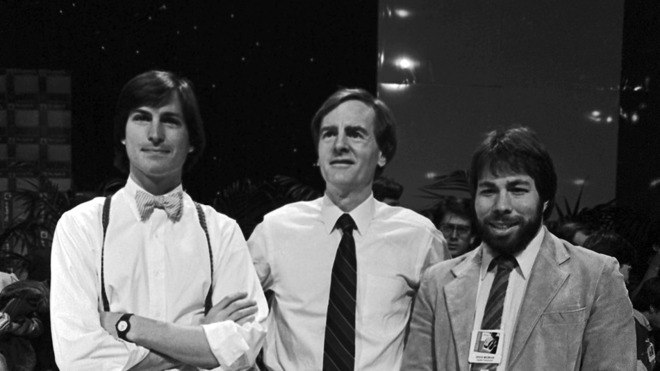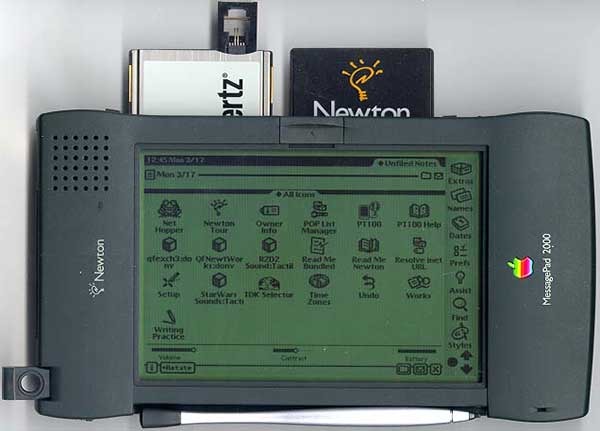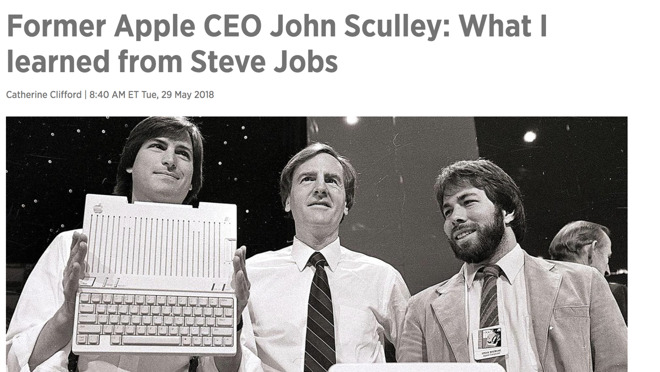25 years ago, Apple's board of directors pushed out CEO John Sculley
The CEO who famously won a power struggle with Steve Jobs in 1985 surrendered the chief executive position a quarter-century ago, placing the executive in a unique, strange purgatory.

The CEO of PepsiCo during the "Cola wars" of the early 1980s, Sculley was famously lured to Apple in 1983 with Steve Jobs' pitch "do you want to sell sugared water for the rest of your life? Or do you want to come with me and change the world?" Unlike many Jobs quotes that frequently circulate, that one was real and not apocryphal.
Scully's initial hiring was an early example of what's known in Silicon Valley as "adult supervision"- an upstart company bringing in a veteran CEO to oversee its young, inexperienced founders.
Despite a positive start, Jobs and Sculley soon clashed over everything from the fate of the Macintosh division, to how much to focus on education, through Jobs' supposed insubordination. In 1985, Jobs attempted a coup against Sculley, which failed, leading to Jobs' banishment and resignation later that year.
Sculley and Jobs never reconciled prior to Jobs' death in 2011.
"He never forgave me for that," Sculley told Business Insider in a 2015 interview. "No. [The friendship was] never repaired. And it's really a shame because if I look back, I say what a big mistake on my part."
Sculley remained CEO of Apple for another eight years after the battle and for ten years altogether, a pretty long tenure by most standards. But, Sculley has long been defined in the public imagination by his clash with Jobs, with his departure mostly seen as an event that started a chain of events that led to the co-founder's eventual return.
That, at least, comprises an outsized percentage of what Sculley has been asked about over the years in interviews.

Sculley's tenure spans the introduction of the Macintosh in early 1984, including its legendary marketing push that included the 1984-inspired Super Bowl commercial. Other successes included the launch of the PowerBook and the addition of color to the MacOS operating system interface, both in 1991, which is remembered as a period of significant innovation in Mac history. Sculley emphasized desktop publishing and other new functions of the Macintosh.
As for Sculley's failures, he was present for the introduction of numerous failed products, most notably the Newton personal digital assistant, and a switch to the PowerPC microprocessor which Sculley later acknowledged as a mistake. By early 1993, things had clearly gotten ugly for Sculley at Apple.
Sculley resigned at CEO of Apple on June 18, 1993 with Michael Spindler stepping in as his replacement. Sculley, however, remained the company's chairman for an additional four months.
During that time he took a sabbatical and began spending more time with his wife in Connecticut, with Fortune reporting that Sculley had lobbied the incoming Clinton Administration for a nomination as Secretary of Commerce.
Sculley would resign from the board in October of that year, following another terrible quarter. Mike Markkula would replace him as chairman.
A lawsuit at the time from ousted board member Albert A. Eisenstat, The Los Angeles Times reported, alleged that the Apple board had misrepresented the circumstances of Sculley's deparature as CEO. The suit was dismissed in late 1993.
Things for Apple would get much worse in the ensuring years, under Spindler and his successor Gil Amelio, leading up to Jobs' return to the company in 1997.
Sculley's first position after Apple was as CEO of Spectrum Technologies, an early wireless telecommunications firm. That was a job that ended in acrimony within a year.
In the last two decades Sculley has mostly been known as a serial entrepreneur. He founded or invested in a wide variety of companies in the years since, including MetroPCS, NFO Research, Hotwire.com, PopTech, and even a wine accessory called The Wine Clip, which he had enjoyed as a customer and later decided to invest in the company.
His most recent ventures are the data company Zeta Global, the emerging market smartphone company Obi Worldphone and the healthcare firm RxAdvance.
Despite all of his other ventures, the now 79-year-old John Sculley is in a position different from just about any other executive in the history of American business. Despite a long and relatively distinguished career, nearly all of the frequent interviews Sculley gives are about a job he had three decades ago that didn't ultimately work out, and his clash with the man who is seen as a legendary figure.
A 2013 piece in Forbes stated that "after years of silence, former Apple CEO John Sculley has recently been moving more into retrospective mode," citing a talk Sculley had given at a conference in Indonesia, although Sculley had been giving interviews about Jobs as early as CES in January 2012. In 2010, in fact, Sculley called it a "big mistake" that he was even hired at Apple.
The timing of Sculley's media tour wasn't exactly coincidental; Jobs had passed away in late 2011, and a wide variety of books and movies, most notably Walter Isaacson's bestselling authorized biography of Jobs, had brought the late CEO's legacy and the details of his biography to the forefront of public attention. In the Ashton Kutcher Steve Jobs movie, Sculley was portrayed by Matthew Modine; in the Michael Fassbender version, he was played by Jeff Daniels, as he and Jobs had an intense confrontation that very much did not actually take place:
More recently, however, there's been a new interview with Sculley on a seemingly monthly basis, and the main topic of nearly all of them is Sculley's relationship and history with Steve Jobs.
Sculley talked about Jobs with C-Suite TV Insights in late 2017, with Forbes last October and then again the following month, and with CNBC in May of this year.
Sculley is also sometimes asked in interviews about present-day goings-on at Apple, general business topics, or even his current ventures. Sculley also made news earlier this year for purchasing a home in Palm Beach for nearly $15 million, indicating that whatever else you can see about the man, his career has made him fantastically wealthy.
It must be odd for Sculley to constantly have to answer questions about a not-very-comfortable period in his professional life more than 30 years ago.

The CEO of PepsiCo during the "Cola wars" of the early 1980s, Sculley was famously lured to Apple in 1983 with Steve Jobs' pitch "do you want to sell sugared water for the rest of your life? Or do you want to come with me and change the world?" Unlike many Jobs quotes that frequently circulate, that one was real and not apocryphal.
Scully's initial hiring was an early example of what's known in Silicon Valley as "adult supervision"- an upstart company bringing in a veteran CEO to oversee its young, inexperienced founders.
Despite a positive start, Jobs and Sculley soon clashed over everything from the fate of the Macintosh division, to how much to focus on education, through Jobs' supposed insubordination. In 1985, Jobs attempted a coup against Sculley, which failed, leading to Jobs' banishment and resignation later that year.
Sculley and Jobs never reconciled prior to Jobs' death in 2011.
"He never forgave me for that," Sculley told Business Insider in a 2015 interview. "No. [The friendship was] never repaired. And it's really a shame because if I look back, I say what a big mistake on my part."
Sculley remained CEO of Apple for another eight years after the battle and for ten years altogether, a pretty long tenure by most standards. But, Sculley has long been defined in the public imagination by his clash with Jobs, with his departure mostly seen as an event that started a chain of events that led to the co-founder's eventual return.
That, at least, comprises an outsized percentage of what Sculley has been asked about over the years in interviews.
The CEO years
John Sculley came to Apple in order to apply his "Pepsi Challenge"-era marketing wizardry to the computer business, while also giving the company some experience and veteran expertise. At the time that Sculley became CEO of Apple, Steve Jobs was 28 years old, and Sculley was 44.
Sculley's tenure spans the introduction of the Macintosh in early 1984, including its legendary marketing push that included the 1984-inspired Super Bowl commercial. Other successes included the launch of the PowerBook and the addition of color to the MacOS operating system interface, both in 1991, which is remembered as a period of significant innovation in Mac history. Sculley emphasized desktop publishing and other new functions of the Macintosh.
As for Sculley's failures, he was present for the introduction of numerous failed products, most notably the Newton personal digital assistant, and a switch to the PowerPC microprocessor which Sculley later acknowledged as a mistake. By early 1993, things had clearly gotten ugly for Sculley at Apple.
Endgame
As a result of PC price wars that hurt Apple significantly, the company made only $86 million in profit in fiscal 1993, as opposed to $530 million the year before. The drop in profits led to significant layoffs inside Apple.Sculley resigned at CEO of Apple on June 18, 1993 with Michael Spindler stepping in as his replacement. Sculley, however, remained the company's chairman for an additional four months.
During that time he took a sabbatical and began spending more time with his wife in Connecticut, with Fortune reporting that Sculley had lobbied the incoming Clinton Administration for a nomination as Secretary of Commerce.
Sculley would resign from the board in October of that year, following another terrible quarter. Mike Markkula would replace him as chairman.
A lawsuit at the time from ousted board member Albert A. Eisenstat, The Los Angeles Times reported, alleged that the Apple board had misrepresented the circumstances of Sculley's deparature as CEO. The suit was dismissed in late 1993.
Things for Apple would get much worse in the ensuring years, under Spindler and his successor Gil Amelio, leading up to Jobs' return to the company in 1997.
Sculley after Apple

Sculley's first position after Apple was as CEO of Spectrum Technologies, an early wireless telecommunications firm. That was a job that ended in acrimony within a year.
In the last two decades Sculley has mostly been known as a serial entrepreneur. He founded or invested in a wide variety of companies in the years since, including MetroPCS, NFO Research, Hotwire.com, PopTech, and even a wine accessory called The Wine Clip, which he had enjoyed as a customer and later decided to invest in the company.
His most recent ventures are the data company Zeta Global, the emerging market smartphone company Obi Worldphone and the healthcare firm RxAdvance.
A strange purgatory

Despite all of his other ventures, the now 79-year-old John Sculley is in a position different from just about any other executive in the history of American business. Despite a long and relatively distinguished career, nearly all of the frequent interviews Sculley gives are about a job he had three decades ago that didn't ultimately work out, and his clash with the man who is seen as a legendary figure.
A 2013 piece in Forbes stated that "after years of silence, former Apple CEO John Sculley has recently been moving more into retrospective mode," citing a talk Sculley had given at a conference in Indonesia, although Sculley had been giving interviews about Jobs as early as CES in January 2012. In 2010, in fact, Sculley called it a "big mistake" that he was even hired at Apple.
The timing of Sculley's media tour wasn't exactly coincidental; Jobs had passed away in late 2011, and a wide variety of books and movies, most notably Walter Isaacson's bestselling authorized biography of Jobs, had brought the late CEO's legacy and the details of his biography to the forefront of public attention. In the Ashton Kutcher Steve Jobs movie, Sculley was portrayed by Matthew Modine; in the Michael Fassbender version, he was played by Jeff Daniels, as he and Jobs had an intense confrontation that very much did not actually take place:
More recently, however, there's been a new interview with Sculley on a seemingly monthly basis, and the main topic of nearly all of them is Sculley's relationship and history with Steve Jobs.
Sculley talked about Jobs with C-Suite TV Insights in late 2017, with Forbes last October and then again the following month, and with CNBC in May of this year.
Sculley is also sometimes asked in interviews about present-day goings-on at Apple, general business topics, or even his current ventures. Sculley also made news earlier this year for purchasing a home in Palm Beach for nearly $15 million, indicating that whatever else you can see about the man, his career has made him fantastically wealthy.
It must be odd for Sculley to constantly have to answer questions about a not-very-comfortable period in his professional life more than 30 years ago.


Comments
Years ago when I was a newish Apple fanatic I constantly rolled my eyes when I heard the blather from Apple-haters. Nowadays I roll my eyes at supposed Apple fans.
When the founder dies, over 90% of companies go out of business, albeit, sometimes slowly... Boeing, Ford, Apple, Coke, MacDonald's, etc., are the exceptions not the rule.
Sculley was a perfect example of this.
Of the Fortune 500 companies in 1950, 88% are no more!
Only the paranoid survive!
Best.
Tim Cook is doing a fabulous job of operationalizing Apple for maximum profits and shareholder value. But I do worry about Apple's size and whether the company (and especially Tim Cook) still views itself as a lean and hungry organization that believes it still has to prove itself with each new product release and product update cycle. This year's WWDC had much more of a "refinement" flavor to it, which was sorely needed on the software front because of accumulated cruft and overly deep backlogs. WWDC showed that Apple is willing to invest in doing things right. Kudos and BZ to all that, but the other part of the story that Apple must absolutely demonstrate, and sooner rather than later, that they can do the right things and show that they are still as hungry as ever and willing to prove themselves as innovators and trend setters. Apple's mountain of cash cannot save them if they lose the killer instinct, become complacent, or quit trying to prove themselves. The iPhone is a legendary success but it's essentially feature-function complete and riding the slow train to Refinementville. It's also Steve's gig. What comes next, product or service, and displaces the iPhone as Apple's revenue generation leader is what will define the Tim Cook era.
Your claim that Apple isn't innovative is also poppycock. Their engineering chops continue to push the envelope in multiple product sectors and their product design is routinely aped and imitated by the rest of the industry.
But you want new Macs and you want them now, we get it.
These people continue to ignore the fact that all of Apple's product spread fit on a table, they don't have the lose of focus that their concern-troll DOOM narrative pretends they do. AND they're killing it profit. AND they have very high consumer satisfaction rankings. AND they're boss of several product categories (iPhone, iPad, Watch, AirPods, etc... And yes I even still believe their Macs are a shit-ton better than PCs -- especially considering my desktop is a 2011! That's impossible on a crappy PC).
But but but no Steve Jobs!
Today's Apple is still riding on the success of 2007's (or 2007-2012) Apple. The success and good faith trust in Apple were well earned, via great product (as a result of great attention to detail, Q/A, and design). That value doesn't disappear over night when bad decisions start being made. That success was so great that Apple can continue to burn it for years yet, especially when Wall Street gamblers are kept happy.
So few people seem to understand that change isn't instantaneous. We see how one government administration will take credit for the systemic improvements of its predecessor while evading the blame for the harm they themselves have done once they're eventually replaced by their successor. They succeed at this illusion because of how long it takes for the changes to be measured and reported. This game is played repeatedly, whenever the political pendulum swings.
This is the same process happening with Apple; everyone just promotes the illusion of Wall Street value and profit margins as being absolute indicators of success and "doing things right".
It's not.
We already have plenty of signs that the lack of long term planning with Mac hardware has damaged Apple's installed user base in content creation businesses. We have the media slowly waking up to the short product cycle, the way existing iOS devices are crippled by progressive OS updates, the battery consumption problem, the peak level of bugs in "shipping" product, etc.
[Please don't bother reposting that "debunking" article about how new iOS versions aren't slowing CPUs... a misdirect that has become especially egregious and ironic now that it's been proven that the CPUs are definitely throttled for claims of battery quality issues.]
Apple can turn things around easily at this stage. The concern is whether or not upper management cares to attend to any of these long term quality issues, rather than continue to obey obsessions over profit margins and Wall Street pathology.
Then I suggest you get yourself a retina 4k iMac - what a sweet machine. It will replace my dinosaur for sure. If you don't think that's an amazing machine I'd like to know what Dell you think is better (Still runs Windows tho, ew).
And who said anyone was "prioritizing" the quantifiable? They are a valid metric of success, yes, but it's clear Apple is still a league apart from the PC clones and chinese knockoffs. Their brand and consumer ratings remain high, and people continue to vote w/ their wallets. We can't all be zealots, can we? At some point you have to admit that nostalgic curmudgeons aside, people love buying Apple products.
And in my experience 5k is simply a proprietary pain in the you know what - I've read it reported that the ONLY video card in the last generation of iMac that can keep up is the 4GB 395x... Indeed some (esp photographers) may feel it worth the difference, yet I wish it was 4k 27", and I'd love to see both 4k and 8k 40" 110 dpi iMacs for the work I do...
There now seem so many inconsistencies and quirks between all the hardware and annual OS churn at this point the mac just feels to me like an obfuscated, proprietary, complicated mess... Remember what SJ did when he came back to Apple - 4 macs - simple. The ONLY monitor I could not get working with the 2016 MBP I tried was Apple's own Cinema Display, and so I sent the darn thing back. Do we need to mention LG as the 'recommended' option ?
All my SJ era stuff works together, mixes and matches, can adjust for storage, drives, mounts, MacOS for legacy software, RAID in the mini, etc, etc... I can move drives and in some cases even RAM between machines as need demands, and as a 'pro' I miss such consistency and recall a phrase from long ago: 'it just works...'
This also includes the iOS - one of the appeals of the earlier iPhone was simplicity 'a cell phone that does not need a manual' - now we have 150 new features coming our way in just one year...